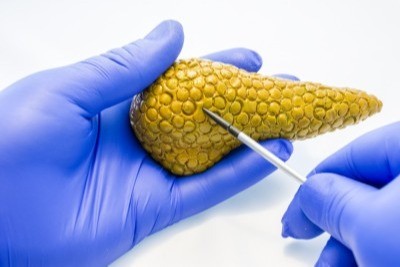Our Featured Research Page lists cancer prevention, treatment and quality of life studies enrolling people with or at high risk for hereditary cancers. Sign up for our community newsletter to stay up-to-date on the latest hereditary cancer research.
Search Results: Treatment + BRCA + Pancreatic Cancer (10 results)

Treatment
Treatment study for people with advanced solid tumors
Study of a New InvestigationaI Inhibitor to Treat People with Advanced Solid Tumors
The study will test if an investigational treatment, XL309, is safe and works when used alone or in combination with a PARP inhibitor to treat people with some advanced solid tumors.

Treatment
Treatment study for people with advanced breast, ovarian or pancreatic cancer and an inherited or tumor BRCA mutation
Combining the Immunotherapy Dostarlimab and PARP Inhibitor Niraparib for Advanced or Metastatic Breast, Ovarian or Pancreatic Cancer with an Inherited or Tumor BRCA Mutation
This study is looking at the effectiveness of combining a PARP inhibitor called niraparib and an immunotherapy called dostarlimab for treating people with an inherited BRCA mutation (found with genetic testing) or a tumor mutation (found through tumor testing) who have breast, pancreatic, ovarian, fallopian tube or primary peritoneal cancer that is metastatic or advanced and cannot be removed by surgery (unresectable).

Treatment
Treatment study for people with advanced solid tumors
Treating Metastatic Solid Tumors with an Inherited or Acquired Gene Mutation Using the PARP Inhibitor Talazoparib
This study is looking whether the drug Talazoparib (also known as Talzenna) is safe and effective for treating people with advanced solid cancers (including breast, gastric, ovarian, pancreatic, prostate or other solid tumors) in people with an inherited mutation (found through genetic testing) or an acquired mutation (found with biomarker testing) in ATM, ATR, BRCA1, BRCA2, BRIP1, BAP1, BARD1, CDK12, CHEK1, CHEK2, IDH1, IDH2, MRE11A, NBN, PALB2, RAD50, RAD51, RAD51B, RAD51C, RAD51D, RAD54L or other genes.

Treatment
A Randomized Study of Olaparib or Placebo in Patients with Surgically Removed Pancreatic Cancer who have a BRCA1, BRCA2 or PALB2 Mutation (APOLLO)
The usual approach for patients with curable (i.e., non-metastatic) pancreatic cancer is a combination of surgery, FDA-approved chemotherapy, radiation (in select cases), then surveillance monitoring. This means that patients are typically monitored by their oncologist for evidence that the cancer has returned (recurrence), but they receive no additional treatment after the completion of surgery and chemotherapy.
The purpose of EA2192 / APOLLO is to compare the usual approach (observation) to treatment for one year with a drug called olaparib, in patients with BRCA1, BRCA2 or PALB2 mutation. EA2192 / APOLLO will help the study doctors find out if this different approach is better, the same, or worse than the usual approach. To decide if it is better, the study doctors will be looking to see if olaparib delays cancer recurrence compared to the usual approach of surveillance.

Treatment
Treatment study for people with advanced solid tumors, including triple-negative breast, ovarian, pancreatic and prostate cancer
NUV-868 Alone and in Combination With PARP Inhibitors in Patients With Advanced Solid Tumors
This study will test how safe and effective the experimental drug NUV-868 is by itself and in combination with a PARP inhibitor in people with advanced solid tumors. The first part of the study will include people with any solid tumor type, and the second part will include people with triple-negative breast, ovarian, pancreatic or prostate cancers only.

Treatment
Advanced pancreatic cancer or stage 4 breast cancer in people with a BRCA1 or BRCA2 mutation
SHARON: A Clinical Trial for Metastatic Cancer With an Inherited BRCA or PALB2 Mutation Using Chemotherapy and Patients’ Own Stem Cells
The purpose of this study is to see whether the combination of melphalan, BCNU, hydroxocobalamin, ascorbic acid, and autologous (self) bone marrow stem cell infusion, is safe and effective for treating patients with advanced pancreatic cancer or Stage IV, HER2-negative breast cancer who have a BRCA1, BRCA2 or PALB2 inherited mutation. All of these treatments are given intravenously (by vein). This study is open to people who have already received a PARP inhibitor, as well as those who have not. There are no restrictions on the number of prior treatments a patient has received before enrolling.

Treatment
Advanced ovarian, breast, prostate or pancreatic cancer
Investigational PARP Inhibitor AZD5305 Alone or Combined With Other Anti-cancer Agents in People With Advanced Solid Tumors (PETRA)
PETRA is studying a new PARP inhibitor AZD5305 taken either alone or combined with other treatments in people with advanced ovarian, breast, prostate or pancreatic cancer with an inherited or tumor mutation in: BRCA1/2, PALB2, RAD51C or RAD51D. The treaments participants receive will depend on their cancer type, mutation and when they join the study.

Treatment
Metastatic pancreatic cancer and a BRCA1 or BRCA2 mutation
Adding Pembrolizumab to Olaparib to Treat Pancreatic Cancer in People with an Inherited BRCA Mutation
This study is researching whether adding the immunotherapy drug Pembrolizumab (Keytruda) to the PARP inhibitor Olaparib (Lynparza) works better than olaparib alone in treating people with metastatic pancreatic cancer who also have an inherited BRCA1 or BRCA2 mutation.

Treatment
Advanced solid tumors
Treatment with ATR Inhibitor for Advanced or Metastatic Solid Tumors
This study will look at how well a new oral targeted therapy known as an ATR inhibitor works on advanced or metastatic solid tumors with mutations in genes linked to DNA damage repair. The study will look at response to treatment with the drug ART0380 in combination with the chemotherapy agent, gemcitabine.

Treatment
Pembrolizumab and Olaparib for People With Metastatic Pancreatic Cancer with Homologous Recombination Deficiency or Exceptional Response to Platinum Chemotherapy
This is a study for people diagnosed with metastatic pancreatic cancer with Homologous Recombination Deficiency, or whose disease has responded well to first-line or second-line platinum therapy. The goal of this study is to look at whether combining the immunotherapy drug, pembrolizumab and the PARP inhibitor, olaparib is a more effective treatment for this cancer than taking olaparib alone.


